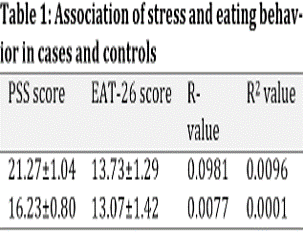Abstract
The present study was undertaken to observe the association between stress and eating behaviour with premenstrual syndrome. Thirty cases of premenstrual syndrome and thirty healthy, age-matched controls, were included in the study after obtaining written informed consent. Premenstrual syndrome questionnaire was used to identify participants with PMS. Stress perception was measured by using the perceived stress scale. PSS is a standard questionnaire, a global measure of perceived stress. The vulnerability of the eating disorder was assessed by using EAT-26. The value of R for the association of stress and eating behavior in participants with the premenstrual syndrome is 0.0981. Although technically a positive correlation, the relationship between your variables is weak. The value of R2, the coefficient of determination, is 0.0096. The value of R for the association of stress and eating behavior in healthy participants is 0.0077. Although technically a positive correlation, the relationship between your variables is weak. The value of R2, the coefficient of determination, is 0.0001. There were significantly high levels of stress score (P=0.0003) in the cases when compared to controls. However, the EAT-26 score is not significant (P=0.7288). A positive correlation was observed between the stress and eating behaviour in both healthy and premenstrual syndrome individuals. The study recommends further studies on a large scale to understand the association and underlying mechanisms to plan better management techniques and also to increase awareness in the student population.
Full text article
Authors

This work is licensed under a Creative Commons Attribution-NonCommercial-NoDerivatives 4.0 International License.

